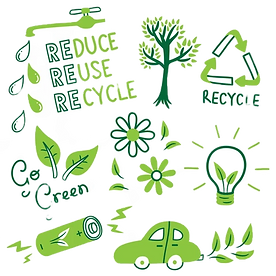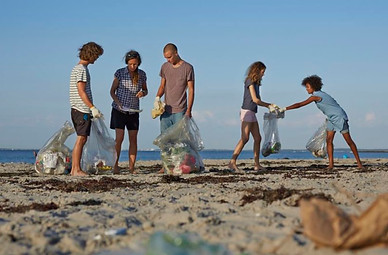
CHANGING HABITS TO CHANGE THE WORLD
Things To Do
Here are some projects for you to get involved with. These projects should do a part in diminishing your carbon footprint. Taking part in these projects will create new habits that will lead to more sustainable living. I firmly believe that by changing individual's habits, we can create a community who will be more mindful towards our environment. Little actions in our everyday lives will pass onto future generations leading to change that will benefit our planet. And this all starts with you!

Educate yourself
Start by understanding what contributes to climate change and what effects it has on you and the people around you. It is also very important to understand your privilege and use it to do good. There are people who are not as fortunate and are more vulnerable to climate change. Being aware of these populations may help push you towards being more sustainable and make changes to your everyday lives. Refer to the "Get Informed" tab and the "Resources" tab to learn more. Once you are educated on what is occurring around the world regarding climate change, you can educate others and urge them to become more mindful in their lives as well. If you or someone you know does not believe in climate change, I urge you to check out the "Still in Denial?" tab before educating yourself.






Appreciate Nature
See what you're fighting for. It is so important to see how beautiful the world is and what you work to preserve. Take a hike. There are many trails, beaches, and mountains all over the world. Taking time to explore the world around us can help you develop a new sense of appreciation for the planet we inhabit. In addition to this new sense of appreciation, being outside can reduce blood pressure, lower heart rate, improves mood, and reduces anxiety levels. Being outdoors can also allow you to reflect on your lives. Go with the people you love and really take in the nature. Learn abut my nature connection on my "Blog" tab.
Reduce, Reuse, Recycle
Take some time to be more mindful of what products you use. Products with more packaging have more material that is wasted. Buying products with minimal packaging reduces the waste and cost to produce it. Reusing products, such as donating or re purposing a product, allows the products to be used more than once, preventing the excessive waste of material. Repairing, maintaining, and borrowing products prevents the material from being thrown away or replaced as frequently. After using the products, separate the materials which can be recycled. In California and several other states, you can cash in your recycling. By keeping the three R's in mind, you will build greener habits.
Limiting Food Waste
Up to 40 percent of food goes uneaten in the United States, which is about 400 pounds of food per person. Being more mindful about the food you waste will significantly decrease the amount of food YOU waste. For example, limiting the serving size to what you can consume will reduce the food you don't finish. Once you've picked that portion, stick to finishing everything on your plate. For any meal you do not finish, just put it into a container and save it for another meal. For more ideas of what you can do, visit this site. Incorporate better habits to do your part in reducing America's food waste. Check on this site to find bigger ways to contribute.

Composting
Composting can do wonders for reducing trash in your household. In fact up to 28% of your regular trash can be composted to produce soil conditioner. Compost is a way of keeping such materials out of landfills where they, instead of becoming rich soil nutrients, would release methane gas. It is quite easy to start! Just find what you can compost and find your method of compost! You can choose to purchase a compost tumbler or build it from recycled pallet wood. When you have gathered your materials and you have your bin, you can start building your brown and green layers. Here is a video containing all the information you need to start your pile!

Cleaning up your surroundings
This can be another habit you add to you everyday routine. If you see a piece of trash when you're out and about, just pick it up and throw it away in the nearest trash can. It's the simplest thing you can do but it truly makes all the difference. Do your part and encourage others to clean up the community. If you want to take the extra step, you can take part in beach cleanups. If you're unsure where to start cleaning, just start in your own neighborhood or local park. Get your friends and family to join you. Building healthy habits and spending time with people you love will give you a sense of satisfaction and allow you to enjoy the time spent on such projects.


Be Mindful When Shopping
Make it a habit to shop from sustainable brands. Find out what their missions are. Brands with ethically sourced materials may be more expensive but as more of the population shifts towards such material, the price will likely be reduced. Try thrifting and make it into a fun thing to do with your friends. By thrifting, you're fighting against fast fashion. When you're shopping for basic products, there are also plenty of eco-friendly products that have sustainable packaging. It doesn't take a lot of effort to find hem either! When shopping for your produce, shop from farmers markets or buy organic! It's better for you and for the environment. By doing this, you're promoting long- term sustainability.
Start a club
Make a club at your school to find people like you who care about saving the environment. You can have club meetings to educate people who may not be as educated as you are. Feel free to use my website as a guide to lead your meetings or spark more ideas. Make it well known to care and normalize picking up trash around your school or communities. Start recycling, collect used notebook paper for your compost, collect used markers and send to crayola to be repurposed, reduce food being wasted, and even reach out to your city council to take more action. Starting with educating and if you have trouble starting a project due to lack of funds, host a fundraiser.